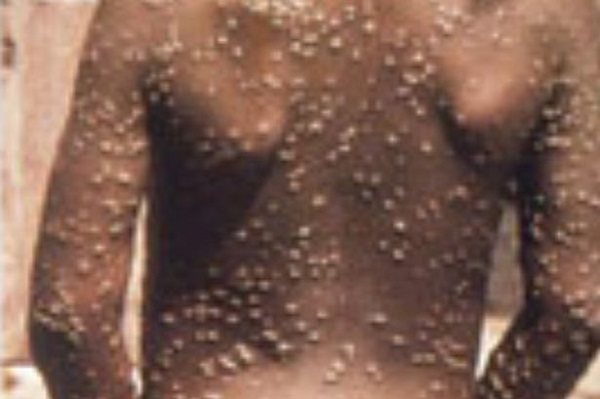
An associate professor of infectious diseases at the Nasarawa State University, Dr. Ishaku Akyala has called on the Federal Government to reactivate the Presidential Task Force in light of the increasing cases of Mpox (formerly known as Monkeypox) across Nigeria.
In an interview with journalists over the weekend in Abuja, Akyala emphasised the need for a coordinated and proactive approach to prevent the spread of Mpox and ensure a swift and effective response to any potential outbreaks.
Akyala stressed that the lessons learned during the COVID-19 pandemic should guide the country’s approach to managing the Mpox outbreak. He highlighted the critical role the Presidential Task Force played in curbing the spread of COVID-19, suggesting that a similar strategy is urgently needed to prevent Mpox from escalating into a national health emergency.
“The recent surge in Mpox cases across several states underscores the urgency for immediate action to safeguard public health,” Akyala stated. He expressed concern over the limited response from authorities so far, noting that Mpox cases might be underreported due to inadequate surveillance and diagnostic capacities.
According to Akyala, reactivating the Presidential Task Force would provide a structured and coordinated response to the Mpox outbreak. “The task force has the experience, resources, and personnel to manage such health emergencies, ensuring that the government can respond effectively and swiftly,” he added.
One of the challenges in controlling the spread of Mpox, Akyala noted, is the difficulty in accurately diagnosing the disease, especially in its early stages or in cases with atypical symptoms. “Mpox can resemble other viral infections like chickenpox, measles, or hand, foot, and mouth disease. It can also be confused with conditions such as impetigo or secondary syphilis, which present with similar lesions, making it challenging to distinguish between them based on symptoms alone,” he explained.
The health expert warned that non-infectious skin conditions, such as contact dermatitis, eczema, or drug reactions, could mimic the rash caused by Mpox, leading to potential misdiagnosis. He pointed out that in regions where Mpox is not commonly seen, healthcare providers might not immediately consider it as a diagnosis, especially if the patient lacks a known history of exposure to Mpox-endemic areas or if there is no ongoing outbreak. “In some cases, Mpox lesions may be misinterpreted as insect bites or acne, particularly if they don’t follow the typical progression of the disease,” he said.
To address these challenges, Akyala emphasised the importance of laboratory testing, particularly polymerase chain reaction (PCR) tests, to detect viral DNA and ensure accurate diagnosis. He urged the task force to adopt a more aggressive approach that goes beyond addressing human-to-human transmission. “We need to focus on wildlife clusters in states with high incidences of Mpox. Identifying transmission foci within these clusters and targeting them is essential to prevent further spread,” he stated.
Akyala also recommended that the task force prioritise public health communication, especially in areas where misinformation and stigma are prevalent. “Clear and accurate messaging is key to ensuring public cooperation and compliance with health guidelines,” he added. Misdiagnosing Mpox, according to him, could have serious public health implications, including delayed isolation of cases and further transmission of the virus. “In areas with limited access to advanced diagnostic facilities, the risk of misdiagnosis is higher, underscoring the need for a coordinated response that includes making diagnostic resources widely available,” he stressed.
He further highlighted the importance of training healthcare workers to recognise and manage Mpox, particularly in regions where the disease is not common. “Nigeria has reported an uptick in Mpox cases in recent months, with the Nigeria Centre for Disease Control (NCDC) confirming over 48 cases in 2024, and more suspected cases are under investigation,” Akyala said.
Akyala concluded by suggesting that reactivating the Presidential Task Force would also provide an opportunity to integrate Mpox response efforts with other ongoing public health initiatives, ensuring a more comprehensive and effective strategy. “This would allow us to leverage existing resources and expertise to combat the outbreak more efficiently,” he noted.
Recall, the Presidential Task Force on COVID-19 was established by former President Muhammadu Buhari on March 9, 2020, to coordinate Nigeria’s multi-sectoral efforts to combat the COVID-19 pandemic. The task force’s key responsibilities included guiding the National Emergency Operations Center and other government agencies, overseeing the implementation of national and state-level outbreak control measures, and managing resources for an effective response. Additionally, the task force engaged with international bodies to share best practices and kept the public informed about the nation’s COVID-19 response.
The success of the Presidential Task Force during the COVID-19 pandemic demonstrates its potential to manage other emerging health crises effectively. By reactivating this task force, the Federal Government would be taking a crucial step in addressing the current Mpox outbreak and preventing it from becoming a larger public health threat.
As of August 27, Nigeria has reported 48 Mpox cases across 19 states and the Federal Capital Territory (FCT), according to the NCDC, with no deaths recorded. The country recently received 10,000 vaccine doses from the United States to help control the outbreak. Meanwhile, the African Union has declared a public health emergency due to the virus’s rapid spread across the continent. Mpox, transmitted through contact with infected individuals or objects, typically causes mild symptoms but can lead to severe cases. The World Health Organisation (WHO) is working to expedite vaccine access, with 230,000 doses expected to be sent to affected areas, although the supply remains limited.

